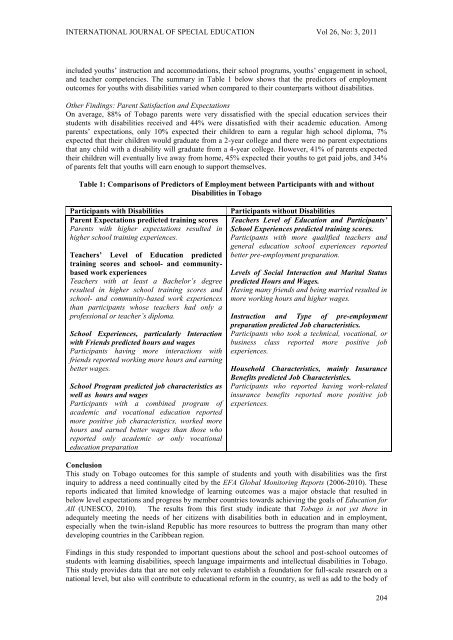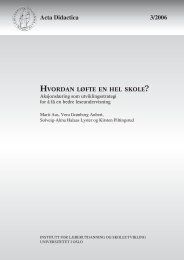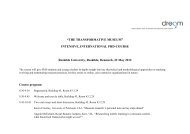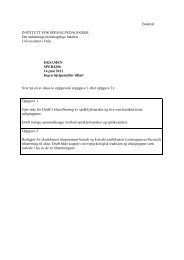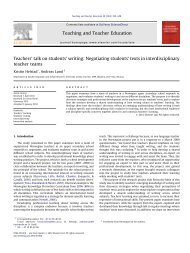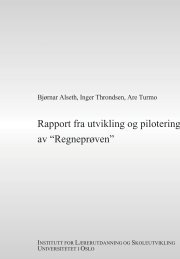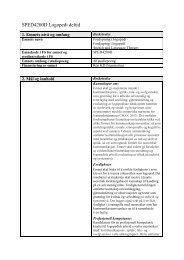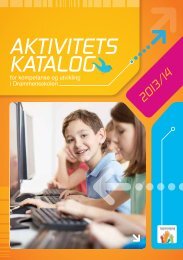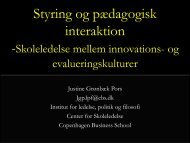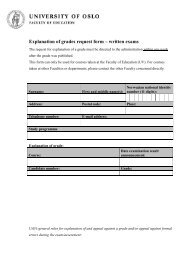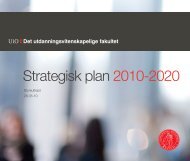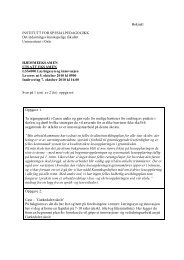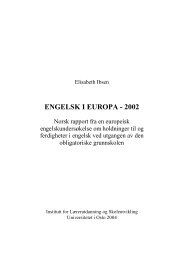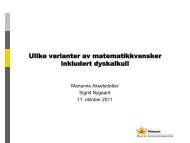International Journal Special Education
International Journal Special Education
International Journal Special Education
You also want an ePaper? Increase the reach of your titles
YUMPU automatically turns print PDFs into web optimized ePapers that Google loves.
INTERNATIONAL JOURNAL OF SPECIAL EDUCATION Vol 26, No: 3, 2011included youths’ instruction and accommodations, their school programs, youths’ engagement in school,and teacher competencies. The summary in Table 1 below shows that the predictors of employmentoutcomes for youths with disabilities varied when compared to their counterparts without disabilities.Other Findings: Parent Satisfaction and ExpectationsOn average, 88% of Tobago parents were very dissatisfied with the special education services theirstudents with disabilities received and 44% were dissatisfied with their academic education. Amongparents’ expectations, only 10% expected their children to earn a regular high school diploma, 7%expected that their children would graduate from a 2-year college and there were no parent expectationsthat any child with a disability will graduate from a 4-year college. However, 41% of parents expectedtheir children will eventually live away from home, 45% expected their youths to get paid jobs, and 34%of parents felt that youths will earn enough to support themselves.Table 1: Comparisons of Predictors of Employment between Participants with and withoutDisabilities in TobagoParticipants with DisabilitiesParent Expectations predicted training scoresParents with higher expectations resulted inhigher school training experiences.Teachers’ Level of <strong>Education</strong> predictedtraining scores and school- and communitybasedwork experiencesTeachers with at least a Bachelor’s degreeresulted in higher school training scores andschool- and community-based work experiencesthan participants whose teachers had only aprofessional or teacher’s diploma.School Experiences, particularly Interactionwith Friends predicted hours and wagesParticipants having more interactions withfriends reported working more hours and earningbetter wages.School Program predicted job characteristics aswell as hours and wagesParticipants with a combined program ofacademic and vocational education reportedmore positive job characteristics, worked morehours and earned better wages than those whoreported only academic or only vocationaleducation preparationParticipants without DisabilitiesTeachers Level of <strong>Education</strong> and Participants’School Experiences predicted training scores.Participants with more qualified teachers andgeneral education school experiences reportedbetter pre-employment preparation.Levels of Social Interaction and Marital Statuspredicted Hours and Wages.Having many friends and being married resulted inmore working hours and higher wages.Instruction and Type of pre-employmentpreparation predicted Job characteristics.Participants who took a technical, vocational, orbusiness class reported more positive jobexperiences.Household Characteristics, mainly InsuranceBenefits predicted Job Characteristics.Participants who reported having work-relatedinsurance benefits reported more positive jobexperiences.ConclusionThis study on Tobago outcomes for this sample of students and youth with disabilities was the firstinquiry to address a need continually cited by the EFA Global Monitoring Reports (2006-2010). Thesereports indicated that limited knowledge of learning outcomes was a major obstacle that resulted inbelow level expectations and progress by member countries towards achieving the goals of <strong>Education</strong> forAll (UNESCO, 2010). The results from this first study indicate that Tobago is not yet there inadequately meeting the needs of her citizens with disabilities both in education and in employment,especially when the twin-island Republic has more resources to buttress the program than many otherdeveloping countries in the Caribbean region.Findings in this study responded to important questions about the school and post-school outcomes ofstudents with learning disabilities, speech language impairments and intellectual disabilities in Tobago.This study provides data that are not only relevant to establish a foundation for full-scale research on anational level, but also will contribute to educational reform in the country, as well as add to the body of204


